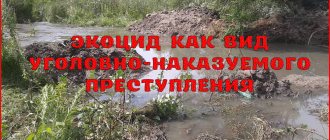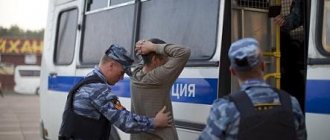ST 357 of the Criminal Code of the Russian Federation.
Actions aimed at the total or partial destruction of a national, ethnic, racial or religious group as such by killing members of that group, causing serious harm to their health, forcibly preventing childbearing, forcibly transferring children, forcibly relocating or otherwise creating conditions of life calculated to bring about physical destruction members of this group are punishable by imprisonment for a term of twelve to twenty years with restriction of freedom for a term of up to two years, or life imprisonment, or the death penalty.
Commentary to Art. 357 Criminal Code
1. The objective side of genocide is characterized by the commission of actions aimed at the complete or partial destruction of a national, ethnic, racial or religious group as such, by means specified in the law, adopted from the Convention on the Prevention and Punishment of the Crime of Genocide of December 9, 1948.
2. A national group is a historical community of people that takes shape during the formation of a common territory, economic ties, literary language, and some cultural and character features that constitute its characteristics.
An ethnic group is a historically emerged stable social group of people united by long-term cohabitation in a certain territory, a common language, culture and identity. Additional conditions may include common religion and racial proximity.
A racial group is recognized as a historically established group of people connected by a unity of origin, which is expressed in common hereditary morphological and physiological characteristics, varying within certain limits: the color of the skin, eyes and hair, the shape of the eyes, the structure of the eyelids, the outline of the head, etc.
A religious group is a group of people professing a common religion, i.e. belonging to the same religion.
3. The concept of murder is disclosed in Article 105 of the Criminal Code of the Russian Federation, the concept of causing grievous bodily harm - in Art. 111 of the Criminal Code.
Forcible prevention of childbearing consists of taking measures that can limit or completely stop the process of having children among members of the above groups (for example, forced sterilization or castration of people, forced termination of pregnancy, etc.).
Forced transfer of children is characterized by their illegal removal from their parents or persons replacing them, against their will, and transfer to other persons or placement in special children's institutions.
Forced relocation is the forced (against their will) movement of representatives of these groups from their place of permanent residence to another place.
Other creation of living conditions designed for the physical destruction of members of these groups may consist, for example, of contaminating the area, water supplies, prohibiting activities that are the main source of existence of the specified group of people, etc.
4. Genocide is recognized as a completed crime from the moment of committing actions aimed at the complete or partial destruction of a specified group of people, regardless of the consequences.
Article 357. Genocide
“Review of the practice of the Constitutional Court of the Russian Federation for 2017” Criminal cases charging women with crimes under part four of article 210, part five of article 228.1, part four of article 229.1, articles 277, 295, 317 and 357 of the Criminal Code of the Russian Federation, if judicial hearings on these criminal cases have not been scheduled at the time the Resolution enters into force; they are subject to consideration by the supreme court of the republic, a regional, regional or other court of equal level, and, at the request of the accused, by a court composed of a judge of such a court and a panel of twelve jurors. The jurisdiction and composition of the court in criminal cases, court hearings for which at the specified time have already been scheduled for consideration, are not subject to change, including within the framework and as a result of their consideration in the appeal, cassation and supervisory procedures.
Appeal ruling of the Judicial Collegium for Criminal Cases of the Supreme Court of the Russian Federation dated November 20, 2018 N 127-APU18-12
By the verdict of the same court dated December 26, 2008, Krasnobryzhiy was convicted under Part 2 of Art. 289 of the Criminal Code of Ukraine (illegal possession of a vehicle, committed repeatedly) to 5 years 6 months of imprisonment, under Art. , part 2 art. 289 of the Criminal Code of Ukraine (attempted unlawful possession of a vehicle, committed repeatedly) to 5 years in prison, under Part 3 of Art. 357 of the Criminal Code of Ukraine (illegal acquisition by any means of a passport or other important personal document) to 3 months of arrest.
Cassation ruling of the Judicial Collegium for Administrative Cases of the Supreme Court of the Russian Federation dated January 30, 2019 N 51-КГ18-16
Part one of Article 173.1 of the Criminal Executive Code of the Russian Federation determines that in relation to an adult person released from prison, if this person has served a sentence for committing a crime with a dangerous or especially dangerous recidivism, or for committing a crime against sexual integrity and sexual freedom a minor, or for committing a grave or especially grave crime provided for in paragraph “l” of the second part of Article 105, paragraph “e” of the second part of Article 111, paragraph “h” of the second part of Article 117, part four of Article 150 (in case of committing a crime based on political, ideological, racial, national or religious hatred or enmity or based on hatred or enmity towards any social group), Articles 205 - 205.5, 206, 208, 211, 220, 221, 277 - 279, 282 - 282.3, 295, 317, 357, 360 and 361 of the Criminal Code of the Russian Federation, or for committing a crime while under administrative supervision, for which this person was sentenced to imprisonment and sent to the place of serving the sentence, the court establishes administrative supervision in accordance with federal law.
Determination of the Constitutional Court of the Russian Federation dated April 25, 2019 N 1183-O
According to Article 3 of the Federal Law “On Administrative Supervision of Persons Released from Places of Imprisonment,” administrative supervision is established in relation to persons released or released from places of imprisonment and who have an outstanding or unexpunged conviction for committing a serious or especially serious crime, a crime in case of repeat crimes , an intentional crime against a minor, two or more crimes provided for in part one of Article 228, Article 228.3, part one of Article 231 and part one of Article 234.1 of the Criminal Code of the Russian Federation, as well as having an outstanding or unexpunged conviction for committing a crime against sexual integrity and sexual freedom a minor, committing a crime during a dangerous or especially dangerous recidivism of crimes, committing a grave or especially grave crime provided for in paragraph “l” of the second part of Article 105, paragraph “e” of the second part of Article 111, paragraph “h” of the second part of Article 117, part of the fourth article 150 (in the case of a crime motivated by political, ideological, racial, national or religious hatred or enmity, or motivated by hatred or enmity against any social group), Articles 205 - 205.5, 206, 208, 211, 220, 221, 277 - 279, 282 - 282.3, 295, 317, 357, 360 and 361 of the Criminal Code of the Russian Federation, commission of a crime while under administrative supervision, for which this person was sentenced to imprisonment and sent to the place of serving the sentence. Imposed administrative restrictions include the prohibition of staying in certain places, visiting places of mass and other events and participating in such events, staying outside a residential or other premises that is the place of residence or stay of a supervised person at a certain time of day, traveling outside the territory established by the court, as well as mandatory attendance from one to four times a month to the internal affairs body at the place of residence, stay or actual location of the person under supervision for registration (Article 4 of the Federal Law “On Administrative Supervision of Persons Released from Places of Imprisonment”).
Determination of the Constitutional Court of the Russian Federation dated October 24, 2019 N 2727-O
According to Article 3 of the Federal Law “On Administrative Supervision of Persons Released from Places of Imprisonment,” administrative supervision is established in relation to persons released or released from places of imprisonment and who have an outstanding or unexpunged conviction for committing a serious or especially serious crime, a crime in case of repeat crimes , an intentional crime against a minor, two or more crimes provided for in part one of Article 228, Article 228.3, part one of Article 231 and part one of Article 234.1 of the Criminal Code of the Russian Federation, as well as having an outstanding or unexpunged conviction for committing a crime against sexual integrity and sexual freedom a minor, committing a crime during a dangerous or especially dangerous recidivism of crimes, committing a grave or especially grave crime provided for in paragraph “l” of the second part of Article 105, paragraph “e” of the second part of Article 111, paragraph “h” of the second part of Article 117, part of the fourth article 150 (in the case of a crime motivated by political, ideological, racial, national or religious hatred or enmity, or motivated by hatred or enmity against any social group), Articles 205 - 205.5, 206, 208, 211, 220, 221, 277 - 279, 282 - 282.3, 295, 317, 357, 360 and 361 of the Criminal Code of the Russian Federation, commission of a crime while under administrative supervision, for which this person was sentenced to imprisonment and sent to the place of serving the sentence. Imposed administrative restrictions include the prohibition of staying in certain places, visiting places of mass and other events and participating in such events, staying outside a residential or other premises that is the place of residence or stay of a supervised person at a certain time of day, traveling outside the territory established by the court, as well as mandatory attendance from one to four times a month to the internal affairs body at the place of residence, stay or actual location of the person under supervision for registration (Article 4 of the Federal Law “On Administrative Supervision of Persons Released from Places of Imprisonment”).
Cassation ruling of the Judicial Collegium for Criminal Cases of the Supreme Court of the Russian Federation dated October 18, 2018 N 127-UD18-16
By the verdict of the Simferopol District Court of the Autonomous Republic of Crimea dated December 9, 2013, Asanov was acquitted under Part 3 of Art. , part 3 art. 146 of the Criminal Code of Ukraine and for the totality of crimes provided for in Part 3 of Art. , clauses 6, 9, 12, 13, part 2, art. 115, part 1 art. , part 3 art. , paragraphs 3, 6, 9, 12, 13, part 2, art. 115, part 1 art. , part 3 art. 146, part 3 art. , part 3 art. , part 2 art. 146, part 3 art. , part 3 art. 146, part 3 art. 146, part 5 art. 185, part 1 art. , part 4 art. 187, part 4 art. 187, part 3 art. , part 4 art. 187, part 3 art. , part 1 art. , part 3 art. 190, part 4 art. 190, part 3 art. , part 4 art. 190, part 3 art. , part 2 art. , part 3 art. 357, part 3 art. , part 3 art. 357, part 3 art. , part 3 art. 357, part 3 art. , part 3 art. 358, part 3 art. , part 1 art. 358, part 3 art. , part 3 art. 358, part 3 art. , part 4 art. 358, part 3 art. , part 4 art. 358 of the Criminal Code of Ukraine, sentenced to life imprisonment with confiscation of property, on the basis of Part 2 of Art. The Criminal Code of Ukraine, together with the sentence of August 4, 2005, is to life imprisonment with confiscation of property.
Appeal ruling of the Judicial Collegium for Criminal Cases of the Supreme Court of the Russian Federation dated August 31, 2017 N 117-APU17-2
Yurchenko D.A., ..., convicted on August 2, 2010 by the Nakhimovsky District Court of Sevastopol under Part 2 of Art. 186, part 3 art. 186, part 3 art. 357 of the Criminal Code of Ukraine to 5 years 6 months in prison, released from prison on October 3, 2014 after serving the sentence;
Determination of the Constitutional Court of the Russian Federation dated September 27, 2018 N 2225-O
In order to implement its prerogatives, the federal legislator classified criminal cases of crimes specified in paragraph 1 of part three of Article 31 of the Code of Criminal Procedure of the Russian Federation, with the exception of criminal cases of crimes provided for in part five of Article 131, part five of Article 132, part six of Article 134, part one Article 212, Articles 275, 276, 278, 279 and 281 of the Criminal Procedure Code of the Russian Federation, to the substantive jurisdiction of the supreme courts of republics, regional, regional and equal courts authorized in accordance with paragraph 2 of part two of Article 30 of the Criminal Procedure Code of the Russian Federation to consider criminal cases as part of judges and jury panels. In paragraph 1 of part three of article 31 of the Code of Criminal Procedure of the Russian Federation, in particular, criminal cases of crimes provided for in part two of article 105, as well as part five of article 131, part five of article 132, part six of article 134, part five of article 228.1, part fourth article 229.1, article 277, part three of article 281, articles 295, 317 and 357 of the Criminal Code of the Russian Federation; This list, however, excludes cases in which, in accordance with the provisions of the criminal law, life imprisonment or the death penalty cannot be imposed as the most severe form of punishment.
Resolution of the Constitutional Court of the Russian Federation dated 06.06.2017 N 15-P
1. According to paragraph 1 of part three of Article 31 of the Code of Criminal Procedure of the Russian Federation as amended by Federal Law of May 5, 2014 N 130-FZ (taking into account the amendments made by Federal Law of March 8, 2015 N 47-FZ) to the supreme court of the republic, regional or regional court, court of a federal city, court of an autonomous region, court of an autonomous district, district (naval) military court have jurisdiction over, in particular, criminal cases of crimes provided for in part two of Article 105, part five of Article 131, part five of Article 132, part six of Article 134, part four of article 210, part five of article 228.1, part four of article 229.1, article 277, part three of article 281, articles 295, 317 and 357 of the Criminal Code of the Russian Federation, with the exception of criminal cases in which, in accordance with the provisions of the Criminal Code of the Russian Federation The most severe form of punishment cannot be life imprisonment or the death penalty.
Resolution of the Constitutional Court of the Russian Federation dated May 11, 2017 N 13-P
1. According to paragraph 1 of part three of Article 31 of the Code of Criminal Procedure of the Russian Federation as amended by the Federal Law of May 5, 2014 N 130-FZ (taking into account the amendments introduced by the Federal Law of March 8, 2015 N 47-FZ), the supreme court of the republic, regional or a regional court, a court of a federal city, a court of an autonomous region, a court of an autonomous district, a district (naval) military court have jurisdiction over, in particular, criminal cases of crimes provided for in part two of Article 105, part five of Article 131, part five of Article 132, part six article 134, part four of article 210, part five of article 228.1, part four of article 229.1, article 277, part three of article 281, articles 295, 317 and 357 of the Criminal Code of the Russian Federation, with the exception of criminal cases in which, in accordance with the provisions of the Criminal Code of the Russian Federation The Federation cannot impose life imprisonment or the death penalty as the most severe form of punishment. At the same time, the possibility of considering criminal cases within the jurisdiction of the supreme court of the republic, a regional, regional or other court of equal level, by a court with the participation of jurors is determined on the basis of paragraph 2 of part two of Article 30 of the Code of Criminal Procedure of the Russian Federation, according to which the court of first instance, at the request of the accused, considers composed of a judge of a federal court of general jurisdiction and a panel of twelve jurors, criminal cases of crimes specified in paragraph 1 of part three of Article 31 of this Code (with the exception of a number of crimes provided for in Articles 131, 132, 134, 212, 275, 276, 278 , 279 and 281 of the Criminal Code of the Russian Federation).
Resolution of the Constitutional Court of the Russian Federation dated March 16, 2017 N 7-P
According to the Federal Law of June 23, 2021 N 190-FZ “On amendments to the Criminal Procedure Code of the Russian Federation in connection with the expansion of the use of the institution of jurors,” part two of Article 30 of the Code of Criminal Procedure of the Russian Federation was supplemented with clause 2.1, introducing a composition of the court that is new to domestic legislation , namely a judge of the district court, a garrison military court and a panel of six jurors. The jurisdiction of the court in this composition includes the consideration, at the request of the accused, of criminal cases of crimes provided for in the second part of Article 105, Articles 277, 295, 317 and 357 of the Criminal Code of the Russian Federation, for which, in accordance with the criminal law, the most severe form of punishment cannot be life imprisonment or the death penalty are imposed, as well as criminal cases for crimes provided for in part one of Article 105 and part four of Article 111 of this Code. The above provision of the criminal procedure law comes into force on June 1, 2021 (Part 2 of Article 2 of the Federal Law of June 23, 2021 N 190-FZ).
Second commentary to Art. 357 of the Criminal Code of the Russian Federation
1. This norm is formulated on the basis of the Convention on the Prevention and Punishment of the Crime of Genocide of 1948. The object is the life and health of a national, ethnic, racial or religious group of people (as a whole).
2. The objective side of the crime under Art. 357 of the Criminal Code, is characterized by actions aimed at the complete or partial destruction of a national, ethnic, racial or religious group of people, as well as by the method specified in the disposition of the commented article.
3. The subject of the crime is a person who has reached the age of 16 years.
4. The subjective side is characterized by direct intent.
Corpus delicti
Genocide is a crime against a group of people united by race, nationality, nationality or religion. There are several ways to commit this crime, all of them are spelled out in the article “Genocide” of the Criminal Code of the Russian Federation:
- The actual murder or infliction of grievous bodily harm on members of a group against which the subject is planning genocide.
- Violent obstruction of childbearing. This may refer to laws prohibiting marriage or limiting the number of children allowed, as well as actual coercive health influences that prevent or terminate pregnancy on a physiological level.
- Forced transfer of children to other families. This refers to situations where in this way the culture transmitted in the family and the child’s self-awareness as a representative of a national or ethnic group are deliberately erased.
- Forced relocation or change in living conditions. Such actions are designed to make life unbearable for a particular group and thus threaten its very existence. This could be the actual relocation to a dramatically different climate, or an existential threat in the form of a ban on certain vital activities or trade.
Note : Since genocide is a crime that can be committed in different ways, the elements of such a crime may vary. Thus, murder or causing grievous bodily harm has a material element of crime, and coercion to hand over children has a formal element.
Objective and subjective sides
Groups of people who may be the target of a crime are united by the following characteristic:
- race - this characteristic is determined by hereditary biological characteristics, including those that influence a person’s appearance. Depending on the approach, a different number of races are distinguished; the most common concept identifies four: Eurasian, Mongoloid, Negroid and Australian;
- Ethnicity is not only a hereditary-physical concept. It includes culture, language, territory, traditions and implies the social and cultural community of people;
- nationality - a historically established community of people, usually larger and more politically defined than an ethnic group;
- religion - we are talking about belonging to a religion that does not correspond to the one that is officially recognized or dominates on the territory of the state.
The objective side of the crime includes the above actions against a national, ethnic, racial or religious group of people. As follows from Art. 357 of the Criminal Code of the Russian Federation, genocide is considered a completed crime from the moment when the subject, using any of the above methods, attempted to destroy one or another group of people.
Important ! The killing of even one representative of this group will be recognized as genocide if the motive was precisely a deliberate action against the existence of the entire group as a whole.
As the comments to Art. 357 of the Criminal Code of the Russian Federation, the subjective side of the crime - intent - is fundamentally important in this case for determining the corpus delicti. The motive of this crime is always the complete or partial destruction of people united by race, nationality, ethnic group or religion.
Object and subject of the crime
Genocide is directed against groups of people united by a characteristic that is either immutable or protected by human rights - in particular, the right to freedom of religion. Therefore, the object of crime is primarily considered to be social relations that provide security to such groups of people.
Human rights and freedoms themselves are put at risk, as are the lives and health of people against whom violent actions are directed. These two factors are additional objects of crime.
The subject of a crime under this article can be any person over the age of 16 years. The verdict is not affected by the position of the person or his position: both the ruler who organized it within the state, and the executor of his orders or an ordinary person can be found guilty - this follows from the Convention on the Prevention of Genocide, adopted in 1946.
If the government of an entire state is responsible for such a crime, the issue is decided by the International Court of Justice.
Reference . It was also planned to consider an attempt to destroy social and political groups as genocide. However, the UN did not come to an agreement, and political killings were excluded from this concept.
Evidence and main problems
As already stated, the purpose of genocide is the destruction of a particular social group united by origin or religion. Intent as the subjective side of this crime can be practically unprovable, especially when it occurs on a state scale and is organized by its government.
There is an opinion that it is impossible to attempt genocide without direct intent. However, a broad evidence base may be required to justify such actions and therefore their targeting.
In addition, the wording of the law, like the previously mentioned Convention on the Prevention of Genocide, speaks of the destruction of a social group “in whole or in part.” This formulation also makes it difficult to determine when a crime has been committed.
Article 357 of the Criminal Code of the Russian Federation resolves this issue as follows: an illegal act is considered completed when harm is caused to at least one representative of the group.
The international document that contains the official definition is the Convention on the Prevention and Punishment of the Crime of Genocide, adopted by the UN in 1948. The definition given in the Convention also corresponds to the one we find in the article of the Criminal Code of our country. It can be said that Art. 357 of the Criminal Code of the Russian Federation with comments to it conveys the essence of the document, fixing its contents in the law of the Russian Federation.
In addition to its definition, the Convention emphasizes that genocide - in time of peace or war - is an international crime, and also defines what acts meet the definition of genocide.
This includes both genocide itself and conspiracy to commit it, attempt to commit it, incitement to it and complicity in it. All these actions will be classified as the same crimes.
The basis of the definition of genocide, from the point of view of the law, is intent: in this case, it is the deliberate desire to destroy, in whole or in part, a certain group of people along racial, national, ethnic or religious principles.
For example, when killing a representative of a certain nationality or religious group, the criminal will be charged with Article 257, and not 105 of the Criminal Code of the Russian Federation, if this intention is proven. Evidence may include, for example, beliefs and attitudes that the perpetrator expressed before committing the crime.
Criminal liability
According to the Criminal Code of the Russian Federation, genocide is considered a grave crime. As a crime against humanity, such an act entails extremely severe punishment.
Criminal liability under Article 357 of the Criminal Code of the Russian Federation for genocide - from 12 to 20 years of imprisonment with two years of restriction of freedom; Life imprisonment or the death penalty may also be imposed.
The UN Convention emphasizes that responsibility is imposed regardless of the social status of the offender, as well as the legitimate status of the government that committed the crime. A person who has committed a crime under the article “Genocide” cannot be acquitted under any circumstances due to the special gravity of this act.
Judicial practice under the article
In modern judicial practice, genocide is rarely charged. In cases where the actions of the accused are motivated by the goal of destroying a certain group united by race, nationality or religion, we are more likely to talk about extremism.
In judicial practice, we find cases specifically under this article, while it is difficult to find a case under the “Genocide” article. Among the known ones there is only one precedent, from 2001, when a mass murder of non-indigenous people occurred in the Chechen Republic.
This is due to many reasons. Among them is the fact that genocide, when there is no difficulty in defining it, falls within the scope of the International Court of Justice.
The political issue often plays a role: recognition of such actions on its territory may mean for the state the emergence of new problems and conflicts that it is not always ready to deal with.









